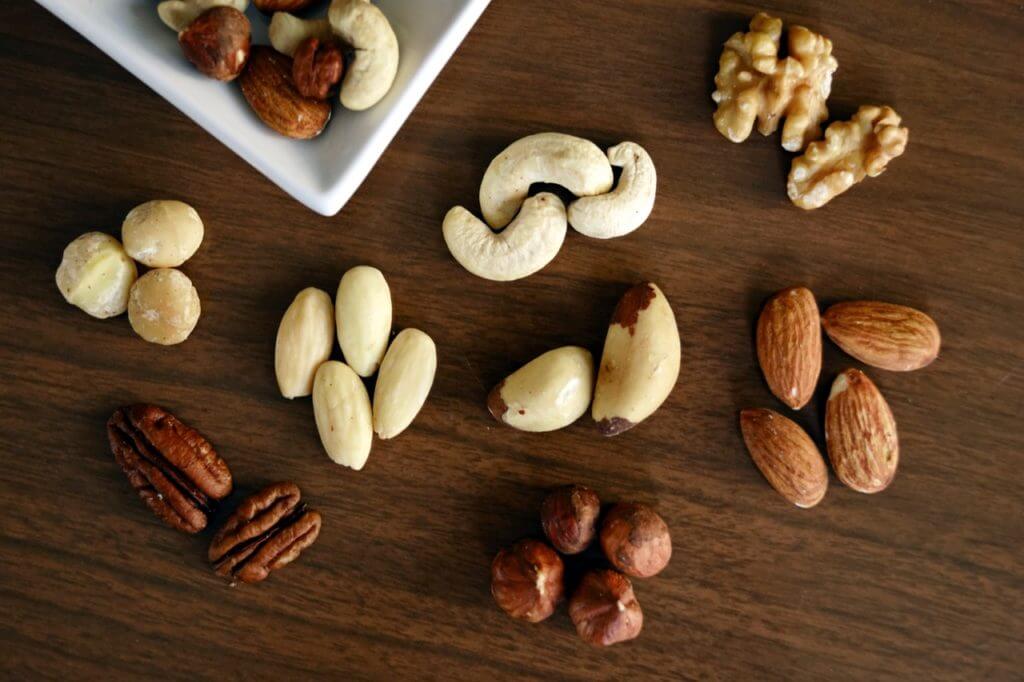Of all the nuts, I’ve always thought cashews had the closest taste to peanuts.
But there are some big nutritional differences between the two that you should consider when choosing a snack (although the higher price of cashews should be factored in as well).
This short post is a detailed head-to-head comparison of cashews to peanuts. We’ll look at the nutritional value per 100 grams of each food.
Table of Contents
Nutritional Value Comparison of Cashews and Peanuts
Both of these foods have a similar amount of fat and calories, but there are a few big differences as well:
| Cashews | Peanuts | |
|---|---|---|
| Energy (kcal) | 573.7 | 567.1 |
| Protein (g) | 15.3 | 25.8 |
| Total Lipid (g) | 46.4 | 49.2 |
| Carbohydrate (g) | 32.7 | 16.1 |
| Fiber (g) | 3.1 | 8.5 |
| Sugars (g) | 5.0 | 4.7 |
It’s clear that peanuts have way more protein (about 66% more) than cashews.
As a result, cashews have more carbohydrates, and yet still have less fiber.
In terms of macronutrients, peanuts have a much better profile in the eyes of most people.
Omega 3 and 6 Fat Ratios of Cashews and Peanuts

One other factor to consider is that most nuts have a poor omega 3 to 6 fat ratio, which can lead to inflammation. See my post on the omega 3 to 6 fat ratio of nuts for more data and a research summary.
| Cashews | Peanuts | |
|---|---|---|
| Omega 3 Fats | 0.161 | 0.01 |
| Omega 6 Fats | 7.66 | 17.2 |
| Omega 6:3 Ratio | 47.58 | 1720.00 |
Despite not being a nut (peanuts are legumes), peanuts still have a lot of fat and a terrible ratio of omega 6 to 3 fats (since there essentially are no omega 3 fats in them).
Cashews also have a poor ratio, but it’s certainly much better than peanuts in this regard.
Vitamins and Minerals of Cashews and Peanuts
A final nutritional area that we’ll look at are the micronutrients in both of these foods.
The RDA values included are general recommendations for adults, but note that your specific RDA for each nutrient may vary.
| RDA | Cashews | Peanuts | |
|---|---|---|---|
| Manganese (mg) | 2.3 | 0.8 | 1.9 |
| Niacin (mg) | 16 | 1.4 | 12.1 |
| Phosphorus (mg) | 700 | 490.5 | 375.3 |
| Magnesium (mg) | 400 | 259.9 | 168.5 |
| Folate (µg) | 400 | 68.6 | 239.7 |
| Vitamin E (mg) | 15 | 0.9 | 8.3 |
| Thiamin (mg) | 1.2 | 0.2 | 0.6 |
| Zinc (mg) | 11 | 5.6 | 3.3 |
| Vitamin K (µg) | 75 | 34.7 | 0.0 |
| Potassium (mg) | 2000 | 565.0 | 705.5 |
| Iron (mg) | 18 | 6.0 | 4.6 |
| Vitamin B-6 (mg) | 1.3 | 0.3 | 0.3 |
| Selenium (µg) | 55 | 11.7 | 7.3 |
| Riboflavin (mg) | 1.3 | 0.2 | 0.1 |
| Choline (mg) | 550 | 61.0 | 52.5 |
| Calcium (mg) | 1200 | 45.3 | 91.8 |
Both have a similar nutrient profile, but excel in different areas:
- Cashews have significantly more magnesium, zinc, and vitamin K
- Peanuts have more manganese, niacin, folate, vitamin E, thiamin, and potassium
I don’t think you can say that one profile is clearly better than the other, it just depends on if someone is looking to add more of a particular mineral or vitamin to their diet.
Cashews vs Peanuts: Which is Healthier?
Both cashews and peanuts are healthy, but peanuts are likely healthier for anyone who does not have an allergy. They have more protein, fiber, and slightly more of most vitamins and minerals.
However, peanuts have a terrible omega 6 to 3 fat ratio, and for that reason alone shouldn’t be eaten in large quantities every day.
Are Cashews or Peanuts Better for Weight Loss?
Since cashews and peanuts both have the same level of calories, neither is better than the other at creating a caloric deficit for weight loss. However, the extra fiber in peanuts may make them more filling for some people.
Are Cashews or Peanuts Better for Bodybuilding?
In a vacuum, peanuts are better than cashews for bodybuilding simply because they have more protein for building muscle. In a 100 gram serving, peanuts have about 26 grams of protein compared to just 15 in cashews.
